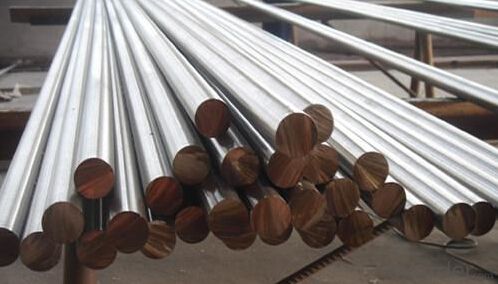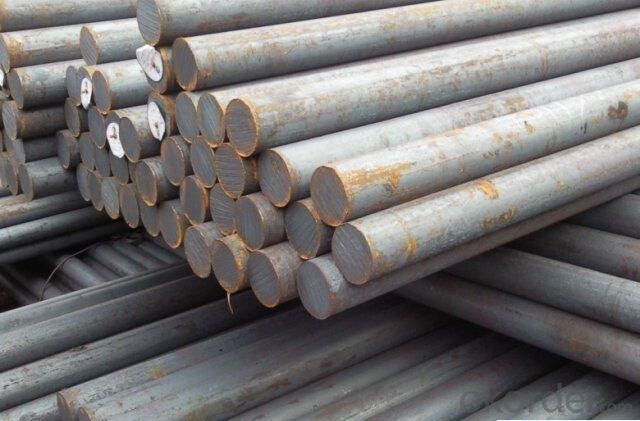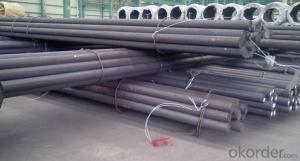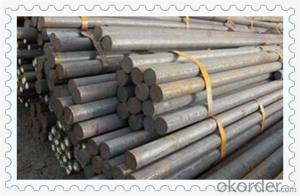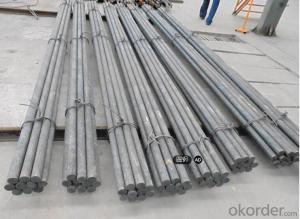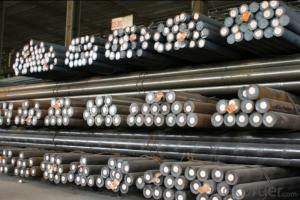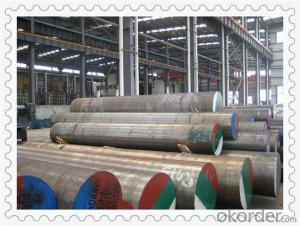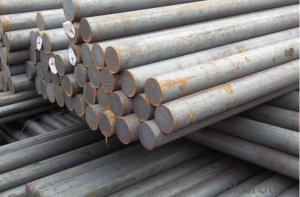Grade AISI1045 CNBM Carbon Steel Round Bar
- Loading Port:
- Shanghai
- Payment Terms:
- TT OR LC
- Min Order Qty:
- 20 m.t.
- Supply Capability:
- 10000 m.t./month
OKorder Service Pledge
OKorder Financial Service
You Might Also Like
Specification
Specifications:
Material | 1045 | Round bar | Dia(mm) | 16-300 |
Process | EAF + LF + VD + Forged + Heat Treatment (optional) | Length (mm) | Max 12000 | |
Heat treatment | Normalized / Annealed / Quenched / tempered | Flat bar | Thickness(mm) | 8-500 |
Delivery condition | Hot forged +Rough machined (black surface after Q/T)+ Turned (optional) | Width(mm) | 70-200 | |
Test | Ultrasonic test according to SEP 1921-84 D/d | Length (mm) | Max 12000 | |
Chemical Composition:
C | Si | Mn | S | P | Cr | Ni | Mo |
0.42~0.50 | ≤0.40 | 0.50~0.80 | ≤0.045 | ≤0.045 | ≤0.40 | ≤0.40 | ≤0.10 |
Usage and Applications:
Mold bottom
Plastic mold
Construction machinery parts
Automobile parts
Security grills
Screens
Construction
Packaging & Delivery:
Packaging Detail: Standard seaworthy packing or as customer required; all goods are packed in bundle with steel strips and shipped by break bulk vessel or container
Delivery Detail: 45 days
Production Flow:
EAF+LF+VD+ Forged+ Heat Treatment
Material prepare (billet) — heat up — rough rolling — precision rolling — cooling — packing — storage and transportation
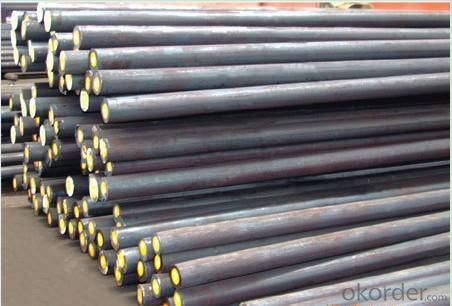
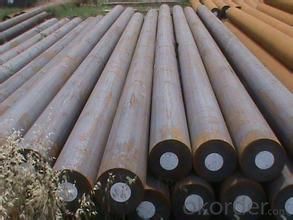
Quality Assurance:
1. We will strictly inspect our production that we sold according to the customer’s request.
2. Our steel reaches international quality standards.
3. Quality should be in conformity with the specification of the manufacturer. Quantity and packing conditions should be in conformity with the term in the contract.
4. Should the packing found damaged, the buyer has the right to claim to the seller
- Q: What are the main factors affecting the tensile strength of special steel?
- The main factors affecting the tensile strength of special steel include the composition of the alloy, the heat treatment processes used, the presence of impurities or defects, the grain size and structure, and the amount of cold work or strain hardening applied to the material. Additionally, factors such as the presence of residual stresses, the temperature at which the steel is tested, and the rate of loading can also influence the tensile strength of special steel.
- Q: How does special steel contribute to the telecommunications aftermarket industry?
- Special steel contributes to the telecommunications aftermarket industry by providing durable and high-quality components for various telecommunications equipment. This steel is used in the manufacturing of antennas, towers, cables, and other crucial parts, ensuring the reliability and longevity of the telecom infrastructure. Additionally, special steel's unique properties, such as corrosion resistance and high electrical conductivity, enhance the performance and efficiency of telecommunications systems, enabling seamless connectivity and better communication services.
- Q: What are the main applications of special steel in the agricultural sector?
- Special steel has various applications in the agricultural sector, primarily in the manufacturing of machinery and equipment. It is used in the production of durable and high-strength components such as plows, tillers, harvesters, and irrigation systems. Special steel's properties, including corrosion resistance and ability to withstand harsh conditions, make it ideal for constructing farm implements that can withstand the demands of agricultural operations. Additionally, special steel is used in the manufacturing of storage tanks, silos, and structures, ensuring the longevity and reliability of agricultural infrastructure.
- Q: How does special steel perform in case hardening applications?
- Special steel performs exceptionally well in case hardening applications. Case hardening is a heat treatment process used to increase the surface hardness of a material while maintaining a tough and ductile core. Special steel, also known as alloy steel, is specifically formulated to have enhanced properties such as high strength, toughness, and wear resistance. In case hardening applications, special steel is ideal due to its ability to form a hard outer layer while retaining its core properties. The process typically involves heating the steel to a specific temperature and then introducing a carbon-rich environment, such as through carburizing or carbonitriding. The carbon atoms diffuse into the steel's surface, creating a high-carbon layer, known as the case, which significantly increases hardness and wear resistance. Special steel's high carbon content allows for deeper and more uniform case hardening compared to other types of steel. This results in improved durability, reduced friction, and enhanced resistance to wear, abrasion, and impact. The tough core of special steel also ensures that the material remains resistant to cracking or fracturing under high stress or impact loads. Additionally, special steel offers excellent machinability, allowing for ease of processing during case hardening applications. This makes it a preferred choice for various industries, including automotive, aerospace, tooling, and manufacturing, where components require both high surface hardness and structural integrity. Overall, special steel is highly regarded for its exceptional performance in case hardening applications. Its combination of high strength, toughness, wear resistance, and machinability makes it an excellent choice for producing durable and reliable components that can withstand demanding operating conditions.
- Q: How does special steel perform in extreme pressure conditions?
- Special steel offers exceptional performance in conditions of extreme pressure, thanks to its unique composition and manufacturing process. It possesses high strength, durability, and resistance to deformation, which make it ideal for applications involving extreme pressures. Under extreme pressure, special steel maintains its structural integrity without significant deformations. This is possible due to its impressive tensile strength, allowing it to withstand tremendous forces without breaking or bending. Furthermore, the hardness and toughness of special steel enable it to resist wear and damage caused by intense pressure. In addition, special steel exhibits excellent heat resistance, which is vital in extreme pressure situations where elevated temperatures are common. Its ability to withstand high temperatures without compromising its mechanical properties ensures its dependability and effectiveness even in the most demanding circumstances. Moreover, the corrosion resistance properties of special steel are outstanding, making it suitable for use in extreme pressure environments where exposure to corrosive substances is a concern. Its resistance to oxidation and other chemical reactions prevents deterioration or weakening, guaranteeing long-term performance and reliability. Overall, special steel excels in extreme pressure conditions due to its high strength, durability, resistance to deformation, heat resistance, and corrosion resistance. These characteristics make it a reliable and efficient choice for various industries and applications that operate in extreme pressure environments, including oil and gas exploration, aerospace, automotive, and heavy machinery manufacturing.
- Q: How is special steel used in the production of molds and dies?
- Special steel is used in the production of molds and dies due to its exceptional durability, hardness, and resistance to wear and tear. This type of steel can withstand high temperatures and pressures, making it ideal for shaping and forming various materials. By using special steel, molds and dies can be manufactured with precision and reliability, ensuring the production of high-quality and accurate parts.
- Q: How does special steel contribute to the heat resistance of products?
- Special steel contributes to the heat resistance of products by offering superior mechanical properties that allow them to withstand high temperatures without deforming or losing their structural integrity. The unique composition and manufacturing process of special steel result in enhanced heat resistance, making it an ideal material for applications exposed to extreme heat conditions. Special steel is designed to have a high melting point, which means it can endure higher temperatures compared to standard steel. This is achieved by incorporating alloying elements such as chromium, nickel, molybdenum, or vanadium, which improve the steel's ability to withstand heat. These elements form stable oxide layers on the surface of the steel, acting as a barrier against oxidation and preventing the steel from losing strength or becoming brittle when exposed to high temperatures. Furthermore, special steel is often treated with heat-resistant coatings or undergoes specialized heat treatment processes to enhance its heat resistance even further. These treatments can include quenching and tempering, annealing, or precipitation hardening, depending on the specific requirements of the product. These processes alter the steel's microstructure, improving its resistance to thermal fatigue, creep, and thermal shock. The heat resistance provided by special steel allows for the creation of products that can operate in demanding environments such as aerospace, automotive, power generation, and industrial applications. For instance, in the aerospace industry, special steel is used to manufacture components like turbine blades that are exposed to extremely high temperatures in jet engines. In the automotive industry, it is utilized for manufacturing exhaust systems and engine components that need to withstand intense heat from combustion processes. In summary, special steel contributes to the heat resistance of products by offering a higher melting point, improved oxidation resistance, and enhanced mechanical properties that allow them to maintain their structural integrity and functionality even under extreme heat conditions. This makes special steel an essential material for various industries seeking reliable and durable solutions that can withstand high temperatures.
- Q: How is free-cutting steel used in the production of precision components?
- Free-cutting steel is used in the production of precision components due to its enhanced machinability. This type of steel contains additives such as sulfur, lead, or bismuth, which help in breaking the chips during machining, resulting in improved cutting performance. This makes it easier for manufacturers to achieve high precision and accuracy when shaping and forming the steel into intricate components. Additionally, free-cutting steel reduces tool wear and increases production efficiency, making it a preferred choice in industries requiring precise and complex parts, such as automotive, aerospace, and medical.
- Q: What are the different surface treatments used for special steel?
- There are several different surface treatments that can be used for special steel, depending on the specific requirements and desired properties. Some of the commonly used surface treatments for special steel include: 1. Nitriding: This process involves diffusing nitrogen into the surface of the steel, resulting in a hardened layer. Nitriding improves the surface hardness, wear resistance, and fatigue strength of the steel. 2. Carburizing: Carburizing involves introducing carbon into the surface of the steel, forming a hard and wear-resistant layer. This process enhances the surface hardness and improves the steel's resistance to wear and fatigue. 3. Coating: Coating is a popular surface treatment technique where a thin layer of protective material is applied to the steel surface. Coatings can include various materials like zinc, chrome, or ceramic, which provide corrosion resistance, improved aesthetics, and enhanced durability. 4. Shot peening: Shot peening is a mechanical surface treatment technique that involves bombarding the steel surface with small metallic or ceramic particles. This process induces compressive stresses in the material, enhancing its fatigue strength and resistance to cracking. 5. Electroplating: Electroplating is a process where a thin layer of metal is deposited onto the steel surface using an electrical current. This treatment provides improved corrosion resistance and can also enhance the appearance of the steel. 6. Passivation: Passivation involves treating the steel surface with a chemical solution to remove impurities and create a protective oxide layer. This process improves the corrosion resistance and enhances the surface finish of the steel. 7. Anodizing: Anodizing is a surface treatment commonly used for aluminum but can also be applied to special steel. It involves creating an oxide layer on the steel surface through an electrolytic process. Anodizing improves corrosion resistance, provides an aesthetic finish, and can also be used for coloring the steel. These different surface treatments offer various benefits and are chosen based on the specific application requirements, such as corrosion resistance, wear resistance, hardness, aesthetics, or improved mechanical properties.
- Q: How does special steel contribute to the efficiency of industrial equipment?
- Several factors contribute to the efficiency of industrial equipment, with special steel playing a crucial role. Firstly, the use of special steel alloys offers superior strength and hardness properties compared to regular steel. This enables the construction of more durable and robust equipment, reducing the frequency of repairs or replacements. Consequently, the overall efficiency of the equipment is improved. In addition, special steel alloys demonstrate excellent resistance to heat and corrosion, making them ideal for use in high-temperature or corrosive environments. This ensures that the equipment can operate reliably, even in challenging settings, without compromising performance or safety. Moreover, special steel alloys provide improved machinability, allowing for more precise manufacturing of industrial equipment components. This precision ensures that the equipment is built to exact specifications, resulting in enhanced overall performance and efficiency. Furthermore, special steel alloys can be tailored to possess specific characteristics, such as high conductivity or magnetic properties. This makes them ideal for applications requiring electrical conductivity or magnetism. By customizing special steel, industrial equipment can be developed to meet specific needs, maximizing efficiency and effectiveness. Overall, the utilization of special steel in industrial equipment significantly enhances its efficiency. Through enhanced strength, durability, heat and corrosion resistance, improved machinability, and customization options, the lifespan, performance, reliability, and safety of the equipment are all improved. Consequently, this leads to enhanced operational efficiency and productivity in industrial settings.
Send your message to us
Grade AISI1045 CNBM Carbon Steel Round Bar
- Loading Port:
- Shanghai
- Payment Terms:
- TT OR LC
- Min Order Qty:
- 20 m.t.
- Supply Capability:
- 10000 m.t./month
OKorder Service Pledge
OKorder Financial Service
Similar products
Hot products
Hot Searches
Related keywords


